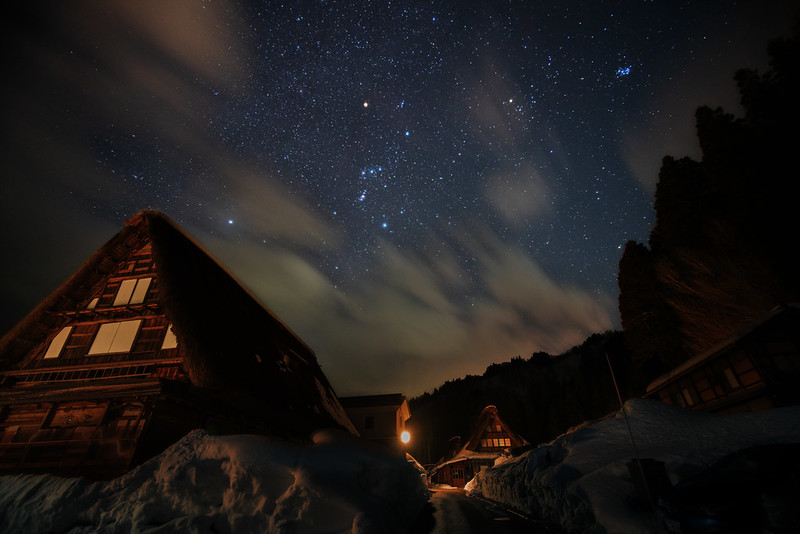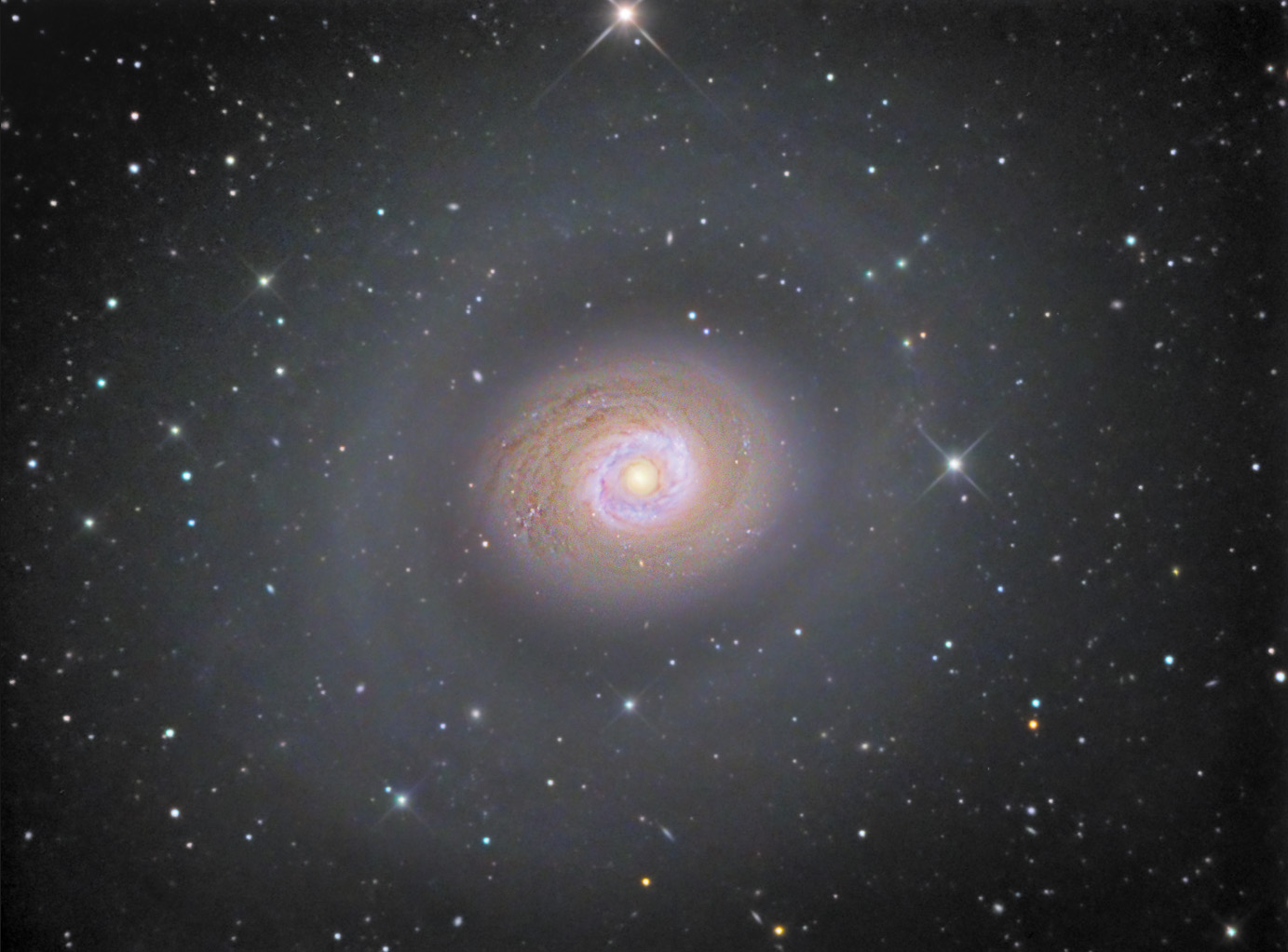Submissions: 2021 February
Submissions: 2021 February
__________________________________________________________________________________________________
Please post your images here.
Please see this thread before posting images; posting images demonstrates your agreement with
the possible uses for your image.
If hotlinking to an image, please ensure it is under 500K.
Hotlinks to images over 500K slow down the thread too much and will be disabled.
Thank you!
_________________________________________________________________________________________________
<- Previous submissions
Please post your images here.
Please see this thread before posting images; posting images demonstrates your agreement with
the possible uses for your image.
If hotlinking to an image, please ensure it is under 500K.
Hotlinks to images over 500K slow down the thread too much and will be disabled.
Thank you!
_________________________________________________________________________________________________
<- Previous submissions
Know the quiet place within your heart and touch the rainbow of possibility; be
alive to the gentle breeze of communication, and please stop being such a jerk. — Garrison Keillor
alive to the gentle breeze of communication, and please stop being such a jerk. — Garrison Keillor
-
ZoliroAstro
- Ensign
- Posts: 10
- Joined: Wed Nov 18, 2020 8:34 pm
Re: Submissions: 2021 February
Ced 214/NGC 7822
Equipment: Astro-Tech AT115EDT, ZWO ASI1600mmPro, Baader narrowband filters, Skywatcher EQ6-R Pro
Processed with Pixinsight and Photoshop
Total integration: 16.1 hours
More acquisition details and higher resolution version can be found on my profile at Ced 214 / NGC 7822
Equipment: Astro-Tech AT115EDT, ZWO ASI1600mmPro, Baader narrowband filters, Skywatcher EQ6-R Pro
Processed with Pixinsight and Photoshop
Total integration: 16.1 hours
More acquisition details and higher resolution version can be found on my profile at Ced 214 / NGC 7822
Re: Submissions: 2021 February
Messier 45 (The Pleiades)
The Pleiades open cluster
Copyright: Andres Molina

See full version at: https://flic.kr/p/2kxAJDt
The most famous open cluster at this year epoch, shines brightly under dark skies, this image was taken on one of the best night's at Tatacoa desert in Colombia.
16/01/20201
Desierto de la Tatacoa, Huila, Colombia
Gear: Camera Canon 70D
Telescope: Orion 6" Astrograph
Mount: Ioptron CEM25P
Image: 89x120s exposure per image, calibrated with dark, flat, bias
Stacked and process Pixinsight 1.8, Photoshop CC 2021
The Pleiades open cluster
Copyright: Andres Molina

See full version at: https://flic.kr/p/2kxAJDt
The most famous open cluster at this year epoch, shines brightly under dark skies, this image was taken on one of the best night's at Tatacoa desert in Colombia.
16/01/20201
Desierto de la Tatacoa, Huila, Colombia
Gear: Camera Canon 70D
Telescope: Orion 6" Astrograph
Mount: Ioptron CEM25P
Image: 89x120s exposure per image, calibrated with dark, flat, bias
Stacked and process Pixinsight 1.8, Photoshop CC 2021
- AlessandroCantarelli
- Ensign
- Posts: 21
- Joined: Fri May 05, 2017 8:41 am
Re: Submissions: 2021 February
"S.T.A.Y."
A 180° multiexposure panorama stitch of 16 shots, 8 for the Land and 8 for the Tracked Milky Way
Sony A7s + Sigma 14mm f1.8 for the land; Canon 6d Astromod for the sky
180° panorama of the best Milky Way I've ever seen in my life.
I like to call Chile an "unfriendly place". The arid expanses of land that characterize the Atacama Desert make jokes about the visitors, you'll be under the illusion that the big mountains on the horizon can be reached in a couple of hours, then on the map, you'll find that they are 800km away...
They have been 10 challenging days, which tested me, in the next pictures that I will post I will tell you about the changes in altitude when at 4500mt of altitude I fainted; Chile is a challenging, complex place...
Once we arrived in San Pedro de Atacama we immediately realized that every photographic spot is closed before sunset, it was forbidden to enter almost all the areas during the night. After a big search, we founded a good location.
When we arrived at Rainbow Valley we were all speechless, the rocks over 20 meters high make this one of the most special places in the world.
After a rich dinner, with the last light and the core of the Milky Way at the Zenith, already shining during the sunset (crazy), I find this spot. I look around, do some calculations with photopills, and wait for the astronomical darkness.
From here, the Milky Way is... no words. The night in the Atacama Desert is an experience, it's a dream come true, to be able to enjoy such an incredible sky is super worth!
_________________________________________________
"Welcome Back"
180° panorama stitch of 6 shots for 15 sec. iso 4000 f2.8 each
Canon 5d Mark 4 + Tamron 15-30 f2.8
I really love this mountain, surely many of you know it, it is the famous Vestrahorn, the most beautiful mountain in Iceland. I was lucky enough to witness this magical night, an explosion of aurora borealis had surprised us during dinner, we decided to get in the car and run on an exclusive location to get a photo that everyone would want to take, a must-have for a night panorama photographer. Upon arriving at the location it was overcast... You can imagine the disappointment we felt during that moment though... We waited for an hour in the cold, standing still, watching the sky slowly start to open up... Finally, the stars, the green light began to dance everywhere, the beauty of this phenomenon on the most beautiful place of the island can not be described, I let the photo speak.
A 180° multiexposure panorama stitch of 16 shots, 8 for the Land and 8 for the Tracked Milky Way
Sony A7s + Sigma 14mm f1.8 for the land; Canon 6d Astromod for the sky
180° panorama of the best Milky Way I've ever seen in my life.
I like to call Chile an "unfriendly place". The arid expanses of land that characterize the Atacama Desert make jokes about the visitors, you'll be under the illusion that the big mountains on the horizon can be reached in a couple of hours, then on the map, you'll find that they are 800km away...
They have been 10 challenging days, which tested me, in the next pictures that I will post I will tell you about the changes in altitude when at 4500mt of altitude I fainted; Chile is a challenging, complex place...
Once we arrived in San Pedro de Atacama we immediately realized that every photographic spot is closed before sunset, it was forbidden to enter almost all the areas during the night. After a big search, we founded a good location.
When we arrived at Rainbow Valley we were all speechless, the rocks over 20 meters high make this one of the most special places in the world.
After a rich dinner, with the last light and the core of the Milky Way at the Zenith, already shining during the sunset (crazy), I find this spot. I look around, do some calculations with photopills, and wait for the astronomical darkness.
From here, the Milky Way is... no words. The night in the Atacama Desert is an experience, it's a dream come true, to be able to enjoy such an incredible sky is super worth!
_________________________________________________
"Welcome Back"
180° panorama stitch of 6 shots for 15 sec. iso 4000 f2.8 each
Canon 5d Mark 4 + Tamron 15-30 f2.8
I really love this mountain, surely many of you know it, it is the famous Vestrahorn, the most beautiful mountain in Iceland. I was lucky enough to witness this magical night, an explosion of aurora borealis had surprised us during dinner, we decided to get in the car and run on an exclusive location to get a photo that everyone would want to take, a must-have for a night panorama photographer. Upon arriving at the location it was overcast... You can imagine the disappointment we felt during that moment though... We waited for an hour in the cold, standing still, watching the sky slowly start to open up... Finally, the stars, the green light began to dance everywhere, the beauty of this phenomenon on the most beautiful place of the island can not be described, I let the photo speak.
Alessandro Cantarelli - Extreme Panoramic Landscapes
https://alexwides.com/ - https://www.instagram.com/alexwidesphotography/ - https://www.facebook.com/AlessandroCantarelliPhoto - +39 3923277373
https://alexwides.com/ - https://www.instagram.com/alexwidesphotography/ - https://www.facebook.com/AlessandroCantarelliPhoto - +39 3923277373
-
Carballada
- Ensign
- Posts: 22
- Joined: Sat Mar 16, 2019 10:19 am
Re: Submissions: 2021 February

The Soul of the Soul (Dobashi 3919) in Hα-SII/OIII/OIII+rgb by Jose Carballada, on Flickr
Always I planned to adquiere as much data as possible of the center of this object.
Now after 80 hours of integration time I am really happy with the results.
A lot of details on LBN673 and a powerful Dobashi 3919 just on the center.
I used a "natural" narrow band palette with the stars in RGB.
-
barretosmed
- Science Officer
- Posts: 482
- Joined: Thu Oct 12, 2017 6:04 pm
Re: Submissions: 2021 February
NGC 6334 - Cat's Paw Nebula
NGC 6334 is a large region of star formation, covering an area in the night sky slightly larger than the full moon. It is one of the most active stellar nurseries that produce massive stars in the Milky Way.
The big bright cloud earned the nickname cat paw because it looks like a giant cat footprint, due to the three bubbles in the image that resemble the pads of its paws.
On the central cushion, a blue bubble resulting from the strong OIII emissions, which is thought to be caused by a Wolf-Rayet type star, is in the final stage of evolution and will be losing mass due to the action of its wind. ; another explanation relates to the fact that it may be a remnant of a recent supernova.
Best details:
https://www.astrobin.com/full/ahg63q/B/?nc=user
Equipments:
Apo 150mm triplet
Qhy 16200mm
CEM 60EC mount
83 x 500 ”- SHO (approximately 12 hours of catch taken)
São Carlos - SP - Brazil
During the month of June - 2019
Processing and capture:
PixInsight, Adobe Photoshop, APT, PHD, Polemaster, SharpCap
Copyright: Fernando Oliveira de Menezes
Email: Barretosmed@hotmail.ccom
NGC 6334 is a large region of star formation, covering an area in the night sky slightly larger than the full moon. It is one of the most active stellar nurseries that produce massive stars in the Milky Way.
The big bright cloud earned the nickname cat paw because it looks like a giant cat footprint, due to the three bubbles in the image that resemble the pads of its paws.
On the central cushion, a blue bubble resulting from the strong OIII emissions, which is thought to be caused by a Wolf-Rayet type star, is in the final stage of evolution and will be losing mass due to the action of its wind. ; another explanation relates to the fact that it may be a remnant of a recent supernova.
Best details:
https://www.astrobin.com/full/ahg63q/B/?nc=user
Equipments:
Apo 150mm triplet
Qhy 16200mm
CEM 60EC mount
83 x 500 ”- SHO (approximately 12 hours of catch taken)
São Carlos - SP - Brazil
During the month of June - 2019
Processing and capture:
PixInsight, Adobe Photoshop, APT, PHD, Polemaster, SharpCap
Copyright: Fernando Oliveira de Menezes
Email: Barretosmed@hotmail.ccom
-
javierflores
- Ensign
- Posts: 10
- Joined: Sun Dec 08, 2019 10:44 am
-
javierflores
- Ensign
- Posts: 10
- Joined: Sun Dec 08, 2019 10:44 am
Re: Submissions: 2021 February
What's going on in the Statue of Liberty nebula? Well, bright stars and interesting molecules are being formed and released. This complex nebula resides in the star-forming region called RCW 57. The image shows dense knots of dark interstellar dust, stars that have formed in the last few million years, fields of hydrogen gas ionized by these stars, and large loops of gas. ejected by dying stars. A detailed study of NGC 3576, also known as NGC 3582 and NGC 3584, has discovered at least 33 massive stars in the final stages of formation as well as the presence of complex carbon molecules known as polycyclic aromatic hydrocarbons (PAHs). HAPs are believed to originate in gas cooling from star-forming regions. Its development in the nebula where the Sun formed, five billion years ago, could have been an important step in the development of life on Earth. The photograph was taken at the ChileScope Observatory on January 26, 2021.


Re: Submissions: 2021 February
Hello folks here NGC2736 Widefield
Telescope: SharpStar 150 f2,8
Guide Scope:Evoguide
Mount : Skywatcher HEQ5
Imaging camera: ZWO 2600MC
Guiding camera: ZWO 290 MC
Filters: IDAS nbx
Plate solving: SGpro
Imaging software: Sgpro
Guiding software: PHD2
Processing software: Pixinsight
IDAS 180X300s exposure@0Gain
Integration: 15hrs
Davide Mancini,Perth,Australia,04/02/2021
Telescope: SharpStar 150 f2,8
Guide Scope:Evoguide
Mount : Skywatcher HEQ5
Imaging camera: ZWO 2600MC
Guiding camera: ZWO 290 MC
Filters: IDAS nbx
Plate solving: SGpro
Imaging software: Sgpro
Guiding software: PHD2
Processing software: Pixinsight
IDAS 180X300s exposure@0Gain
Integration: 15hrs
Davide Mancini,Perth,Australia,04/02/2021
-
barretosmed
- Science Officer
- Posts: 482
- Joined: Thu Oct 12, 2017 6:04 pm
Re: Submissions: 2021 February
HORSEHEAD NEBULA AND FLAME NEBULA
BEST DETAILS:
https://www.astrobin.com/full/7cbs7n/0/?nc=user
EQUIPMENT:
APO TS 80MM
ASI 1600mm cooled
ASIAIR
10 X 200 BIN2 G
4 X 200 BIN2 B
15 X 200 BIN2 R
20 X 300 BIN1 L
GUIDER: asi 120mm mini and ZWO oag
LOCATION: JALES - SP - Brazil
DATES: DECEMBER 26 TO 28, 2019
PROCESSING: FEBRUARY 2 TO 4, 2021
Processing and Capture:
Software: @PIxinsigh, Adobe Photoshop, APT, PHD, Polemaster, SharpCap
Copyright: Fernando oliveira de Menezes
EMAIL: barretosmed@hotmail.com
BEST DETAILS:
https://www.astrobin.com/full/7cbs7n/0/?nc=user
EQUIPMENT:
APO TS 80MM
ASI 1600mm cooled
ASIAIR
10 X 200 BIN2 G
4 X 200 BIN2 B
15 X 200 BIN2 R
20 X 300 BIN1 L
GUIDER: asi 120mm mini and ZWO oag
LOCATION: JALES - SP - Brazil
DATES: DECEMBER 26 TO 28, 2019
PROCESSING: FEBRUARY 2 TO 4, 2021
Processing and Capture:
Software: @PIxinsigh, Adobe Photoshop, APT, PHD, Polemaster, SharpCap
Copyright: Fernando oliveira de Menezes
EMAIL: barretosmed@hotmail.com
Re: Submissions: 2021 February
M-1, CRAB NEBULA
BEST RES:
https://a4.pbase.com/o12/58/756058/1/17 ... HOWIDE.jpg
EQUIPMENT:
APO Astro-Physics 130MM F8.35
ASI 294mm cooled
16 X 600 BIN1 ha
16 X 600 BIN1 OIII
16 X 600 BIN1 SII
GUIDER: STL REMOTE GUIDE HEAD/FMA 180
LOCATION: CERCEDA, MADRID, SPAIN
DATES: DECEMBER 26 , 2020, JANNUARY 15, 2021
PROCESSING: FEBRUARY 2 TO 4, 2021
Processing and Capture:
Software: PIxinsigh, SharpCap
Copyright: Jorge Garcia Martin
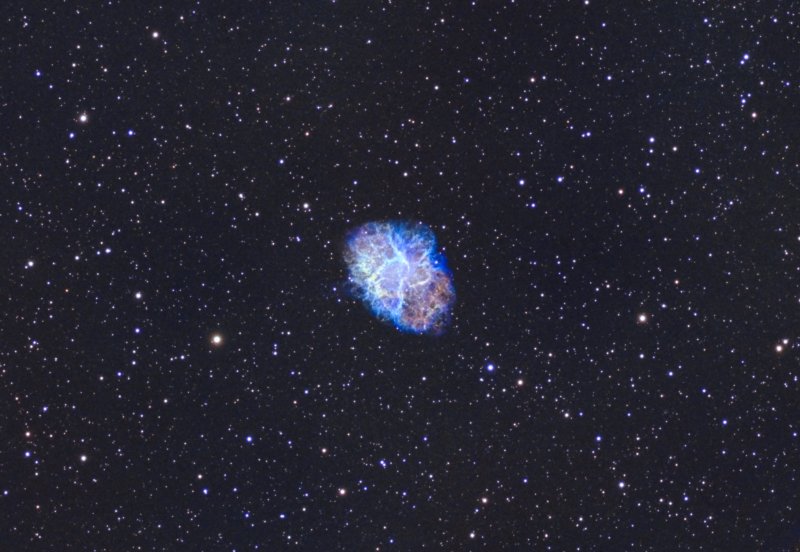
BEST RES:
https://a4.pbase.com/o12/58/756058/1/17 ... HOWIDE.jpg
EQUIPMENT:
APO Astro-Physics 130MM F8.35
ASI 294mm cooled
16 X 600 BIN1 ha
16 X 600 BIN1 OIII
16 X 600 BIN1 SII
GUIDER: STL REMOTE GUIDE HEAD/FMA 180
LOCATION: CERCEDA, MADRID, SPAIN
DATES: DECEMBER 26 , 2020, JANNUARY 15, 2021
PROCESSING: FEBRUARY 2 TO 4, 2021
Processing and Capture:
Software: PIxinsigh, SharpCap
Copyright: Jorge Garcia Martin

-
andrystix
Re: Submissions: 2021 February
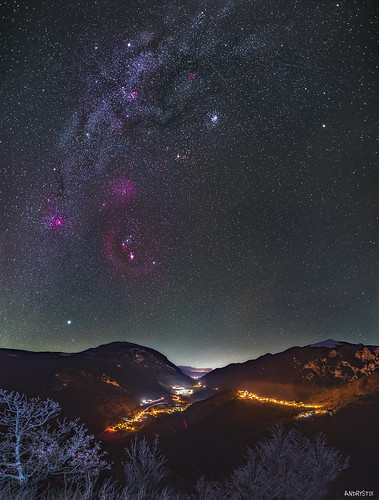 La Via del Parco by Andrea Amici - Andrystix
La Via del Parco by Andrea Amici - AndrystixWinter Milkyway with Orion Molecular Cloud Complex from Marche, Italy
shooted on 16/1/21, 8pm
top: 13 shoots tracked with iOptron Sky Guider Pro (stacked with DSS)
middle: 13 shoots tracked with iOptron Sky Guider Pro (stacked with DSS)
bottom: single shoot for the ground
for the sky: 40s, ISO1600, f/2.8 + 13 darks (to reduce noise)
for the land: single shot 14s, ISO 800, f/4
exif: Nikon D750 (modded), AF-S NIKKOR 20mm f/1.8G ED, iOptron Skyguider Pro.
social: @andrystix on Instagram, Facebook and Flickr.
-
Oliverglobetrotter
Re: Submissions: 2021 February
Good evening everyone,
I present to you the constellation of Orion. Yesterday evening I took advantage of tight timing to shoot, I had to go on a mountain up to 1500m (bortle 3) to avoid the clouds, and I had to shoot before the moon around midnight. Lots of wind of fine clouds, which made me lose half of the stack of 140 lights I went to 66 kept ... It hurts
I wanted to try the set up at lens and camera for the first time by taking my old motorized eq3-2 mount, a friend lent me a Sigma Art 85mm F1.4 lens, which is the perfect frame for Orion with a full format.
https://astrob.in/e8nybt/0/
Apn Canon 6D Iso 1600
Sigma Art 85mm F1.4 lens (open to 2.8)
Motorized eq3-2 mount
66brutes of 90sec
20dof
Pixinsight https://astrob.in/e8nybt/0/
I present to you the constellation of Orion. Yesterday evening I took advantage of tight timing to shoot, I had to go on a mountain up to 1500m (bortle 3) to avoid the clouds, and I had to shoot before the moon around midnight. Lots of wind of fine clouds, which made me lose half of the stack of 140 lights I went to 66 kept ... It hurts
I wanted to try the set up at lens and camera for the first time by taking my old motorized eq3-2 mount, a friend lent me a Sigma Art 85mm F1.4 lens, which is the perfect frame for Orion with a full format.
https://astrob.in/e8nybt/0/
Apn Canon 6D Iso 1600
Sigma Art 85mm F1.4 lens (open to 2.8)
Motorized eq3-2 mount
66brutes of 90sec
20dof
Pixinsight https://astrob.in/e8nybt/0/
-
Ronan Hunt
Re: Submissions: 2021 February
The antennae Galaxy shot using the Telescope Live 24 inch Planewave CDK. 10 minute exposure of each LRGB filter.
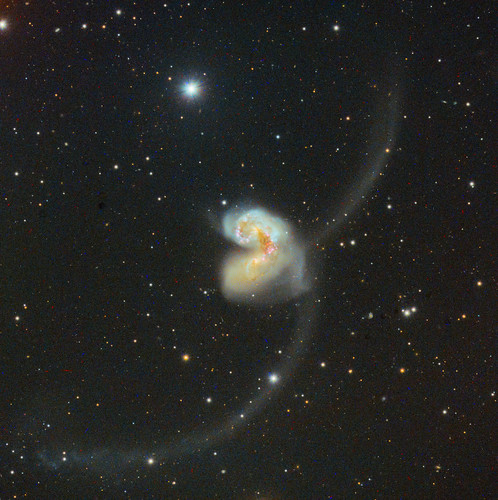 LRGB by Ronan Hunt, on Flickr
LRGB by Ronan Hunt, on Flickr
 LRGB by Ronan Hunt, on Flickr
LRGB by Ronan Hunt, on Flickr-
Knight of Clear Skies
- Ensign
- Posts: 96
- Joined: Mon Jul 25, 2016 9:02 am
Re: Submissions: 2021 February
Orion Revealed

A composite I put together to show what's hiding in the constellation Orion. The middle panel is a short exposure which roughly corresponds with the number of stars that can be seen from a truly dark site. The right hand panel has an hour of H-alpha data blended in in an attempt to show the sheer scale of Barnard's Loop and the Angelfish Nebula in the sky, although it's not possible to do it justice in a photo.
Higher resolution version available here.
I also put together a version to support the CPRE's 2021 star count, a public outreach activity to measure light pollution and promote the benefits of dark skies.

High resolution version available here.
A composite I put together to show what's hiding in the constellation Orion. The middle panel is a short exposure which roughly corresponds with the number of stars that can be seen from a truly dark site. The right hand panel has an hour of H-alpha data blended in in an attempt to show the sheer scale of Barnard's Loop and the Angelfish Nebula in the sky, although it's not possible to do it justice in a photo.
Higher resolution version available here.
I also put together a version to support the CPRE's 2021 star count, a public outreach activity to measure light pollution and promote the benefits of dark skies.
High resolution version available here.
Caradon Observatory, Cornwall, UK.
-
masahiro miyasaka
- Ensign
- Posts: 39
- Joined: Fri Dec 31, 2010 12:37 pm
- Contact:
Re: Submissions: 2021 February
Bok globules and columns in the Pacman Nebula (NGC281)
The Pacman Nebula (NGC 281) is a bright emission nebula in the constellation Cassiopeia. It is about 9500 light-years away. The core of the nebula has been hollowed out by intense wind and radiation from young energetic stars. In fact, the sculpted columns in this view align back to the star cluster IC 1590 located just outside the top of the image. Also visible are dark areas of dense dust and gas called Bok globules. These opaque highly concentrated knots have the potential to create new stars in their cores and are named after astronomer Bart Bok who proposed their existence in the 1940s.
A nice and informative narrative of Bok globules in the Pacman is available from a NASA press release at: https://hubblesite.org/contents/news-re ... 06-13.html.
Nick Pavelchak
Altamont, NY
https://www.astrobin.com/zkoukd/?nc=user
The Pacman Nebula (NGC 281) is a bright emission nebula in the constellation Cassiopeia. It is about 9500 light-years away. The core of the nebula has been hollowed out by intense wind and radiation from young energetic stars. In fact, the sculpted columns in this view align back to the star cluster IC 1590 located just outside the top of the image. Also visible are dark areas of dense dust and gas called Bok globules. These opaque highly concentrated knots have the potential to create new stars in their cores and are named after astronomer Bart Bok who proposed their existence in the 1940s.
A nice and informative narrative of Bok globules in the Pacman is available from a NASA press release at: https://hubblesite.org/contents/news-re ... 06-13.html.
Nick Pavelchak
Altamont, NY
https://www.astrobin.com/zkoukd/?nc=user
-
KuriousGeorge
- Science Officer
- Posts: 218
- Joined: Wed Dec 30, 2015 7:07 am
- Location: San Diego, CA
- Contact:
-
Yovin Yahathugoda
Re: Submissions: 2021 February
SH2-308 (Dolphin Head Nebula)
https://www.astrobin.com/users/YovinRY/
Copyright: Yovin Yahathugoda
Data acquired through Telescope Live platform's remote observatory and processed in HOO palette.
Telescope - ASA 500N
Camera: FLI PL16803
Filters: Astrodon Ha 3nm, Astrodon OIII 3nm
Software: Photoshop 2020, PixInsight
Location - El Sauce Observatory, Río Hurtado, Coquimbo Region, Chile
Lum - Synthetic Luminance
Halpha - 4x600s
OIII - 5x600s
Total Exposure time - 1.5 hours
Full acquisition details at https://www.astrobin.com/lr9pf4/?nc=user
https://www.astrobin.com/users/YovinRY/
Copyright: Yovin Yahathugoda
Data acquired through Telescope Live platform's remote observatory and processed in HOO palette.
Telescope - ASA 500N
Camera: FLI PL16803
Filters: Astrodon Ha 3nm, Astrodon OIII 3nm
Software: Photoshop 2020, PixInsight
Location - El Sauce Observatory, Río Hurtado, Coquimbo Region, Chile
Lum - Synthetic Luminance
Halpha - 4x600s
OIII - 5x600s
Total Exposure time - 1.5 hours
Full acquisition details at https://www.astrobin.com/lr9pf4/?nc=user
Re: Submissions: 2021 February
IC 1396 (Crop - reprocess of last year's data)
Click on image to expand.
Full info and higher resolution: https://www.kinchastro.com/ic-1396-with ... ebula.html
Click on image to expand.
Full info and higher resolution: https://www.kinchastro.com/ic-1396-with ... ebula.html
Re: Submissions: 2021 February
Elephant Trunk Nebula (Crop & reprocess last year's data).
Click on image to enlarge.
Full info @: https://www.kinchastro.com/ic-1396-with ... ebula.html
Click on image to enlarge.
Full info @: https://www.kinchastro.com/ic-1396-with ... ebula.html
-
Guest
Re: Submissions: 2021 February
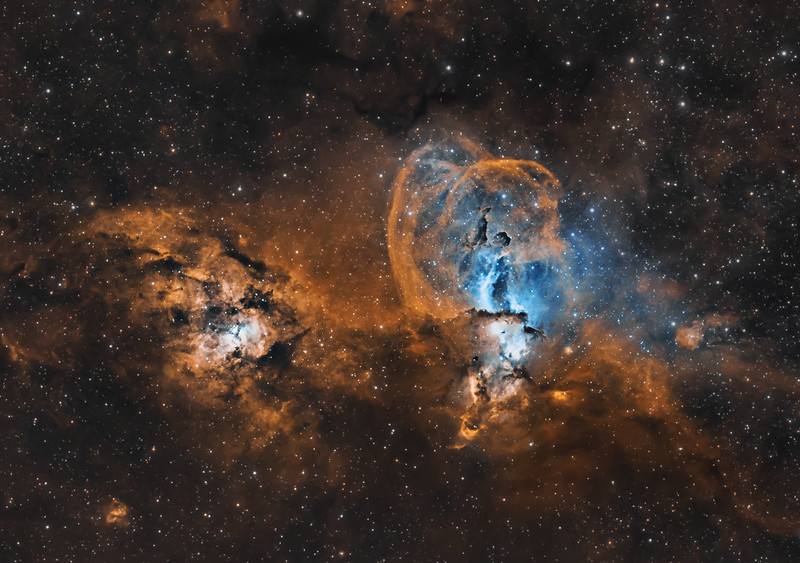 Statue of Liberty Nebula by Logan Carpenter, on Flickr
Statue of Liberty Nebula by Logan Carpenter, on FlickrThe Statue of Liberty Nebula NGC3576
Imaged over three nights 28/1/21-31/1/21
10.5 hrs integration
Location : Auckland, New Zealand
Telescope : Skywatcher Esprit 120ED
Camera : ASI294mcPro with Baader Neodymium filter
Processing in APP, Pixinsight and Photoshop
https://www.astrobin.com/bitb39/B/?nc=user
Re: Submissions: 2021 February
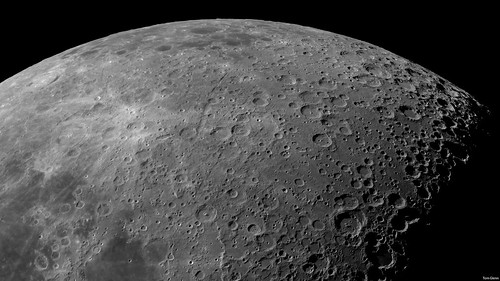 Over the limb--Mare Australe and southeastern libration zone by Tom Glenn, on Flickr
Over the limb--Mare Australe and southeastern libration zone by Tom Glenn, on FlickrThis image shows a view of the southeastern limb of the Moon, taken during a favorable libration. Mare Australe is at the top of the image, and the "far side" crater Jenner (96E longitude) is clearly visible along the limb at 11 o'clock, with its central peak and dark basalt floor. Other notable features in this image include Vallis Rheita (center), Rupes Altai (bottom), Mare Nectaris and Mare Fecunditatis (lower left), and the lunar South Pole (Shackleton crater, upper right of image where the terminator meets the limb). The newly designated Easley crater (named for Annie Easley) is visible at far left on the limb, near Humboldt crater.
Full size image below:
https://live.staticflickr.com/65535/509 ... c85a_o.jpg
Image from July 20, 2018, 03:29UT. C9.25 Edge HD telescope and ASI183mm camera, 610nm filter. Mosaic of two panels. Image captured from San Diego, CA.
-
manfred_konrad
- Asternaut
- Posts: 5
- Joined: Sun Feb 05, 2012 4:49 pm
- Location: Laupheim ,Germany
- Contact:
Re: Submissions: 2021 February
M94
https://astrofotografie-laupheim.de/bil ... nzeige=432
Copyright: Manfred Konrad manfred.konrad@t-online.de 12" Newtonian with ATIK 16HR
LRGB Image L 25x600 sec RGB 30x600sec
https://astrofotografie-laupheim.de/bil ... nzeige=432
Copyright: Manfred Konrad manfred.konrad@t-online.de 12" Newtonian with ATIK 16HR
LRGB Image L 25x600 sec RGB 30x600sec
Re: Submissions: 2021 February
SH2-157 - NGC7635 (Bubble Nebula) - SH2-162 - SH2-159 - NGC7538 - M52 - NGC7510
Copyright: Marco Cosmacini - Osservatorio Villaverde
It took me 30 hours at a 180mm refractor telescope with H-alpha, Oxygen3 and Sulfur2 all at 3 nanometers and one weekend and two nights in post production to combine the channels... but this is the result.
Here a strongly reduced picture is posted here
Original image 8K x 8K pixels is visible at the following link and be sure to use the zoom!
https://www.flickr.com/gp/cosmacini/VquyCL
-
Copyright: Marco Cosmacini - Osservatorio Villaverde
It took me 30 hours at a 180mm refractor telescope with H-alpha, Oxygen3 and Sulfur2 all at 3 nanometers and one weekend and two nights in post production to combine the channels... but this is the result.
Here a strongly reduced picture is posted here
Original image 8K x 8K pixels is visible at the following link and be sure to use the zoom!
https://www.flickr.com/gp/cosmacini/VquyCL
-
Marco Cosmacini
Villaverde Observatory
Italy
Villaverde Observatory
Italy



